Flying to Croatia? Why You Should Print Out These IATA Guidelines
June 16, 2020 - There is a list of things you should have with you when traveling to Croatia in the corona era. A printout of the IATA guidelines is one of them.
There is a lot of uncertainty surrounding travel in the post-corona world, and while many of us worry if it is safe to travel at all, others are wondering what rules and regulations ring true across the board, as we are met with new information each day. In an effort to hopefully curb any confusion, we're telling you why travelers should print out the IATA guidelines if they're flying to Croatia.
International Air Transport Association (IATA) announced the latest COVID-19 entry regulations for each country (with a free online interactive world map to boot), which have apparently proved crucial for those of you flying to Croatia.
But why, you might ask?
Because many airlines and travel agencies are seemingly unaware of the restrictions - and since the IATA guidelines for Croatia begin with 'Passengers are not allowed to enter', we think we know why.
IATA's guidelines for Croatia, published June 16, 2020, are as follows:
1. Passengers are not allowed to enter.
This does not apply to:
-nationals of Croatia and their family members.
-nationals of Austria, Czechia, Estonia, Germany, Hungary, Latvia, Lithuania, Poland, Slovakia and Slovenia.
-nationals of Belgium, Bulgaria, Cyprus, Denmark, Finland, France, Greece, Iceland, Ireland (Rep.), Italy, Liechtenstein, Luxembourg, Malta, Netherlands, Norway, Portugal, Romania, Spain, Sweden and Switzerland when:
- returning via Croatia to their country of residence; or
- traveling on business with an invitation letter; or
- traveling as tourists with accommodation reservation confirmation.
-passengers with a British passport and their family members, when:
- returning via Croatia to their country of residence; or
- traveling on business with an invitation letter; or
- traveling as tourists with accommodation reservation confirmation.
-passengers with a long-term residence permit issued by Croatia.
-passengers with a long term residence permit or a long term "D" visa issued by Austria, Belgium, Bulgaria, Croatia, Cyprus, Czechia, Denmark, Estonia, Finland, France, Germany, Greece, Hungary, Iceland, Ireland (Rep.), Italy, Latvia, Liechtenstein, Lithuania, Luxembourg, Malta, Netherlands, Norway, Poland, Portugal, Romania, Slovakia, Slovenia, Spain, Sweden, Switzerland or United Kingdom when:
- returning via Croatia to their country of residence; or
- traveling on business with an invitation letter; or
- traveling as tourists with accommodation reservation confirmation.
-passengers entering Croatia to transit by land to a third country. They must prove that they can enter the destination country.
2. Passports and national ID cards issued to nationals of Croatia which expired on 11 March 2020 or later are considered valid.
The rules from June 10, 2020, however, have changed from June 2, which initially stated that travel was allowed for business, no matter the nationality.
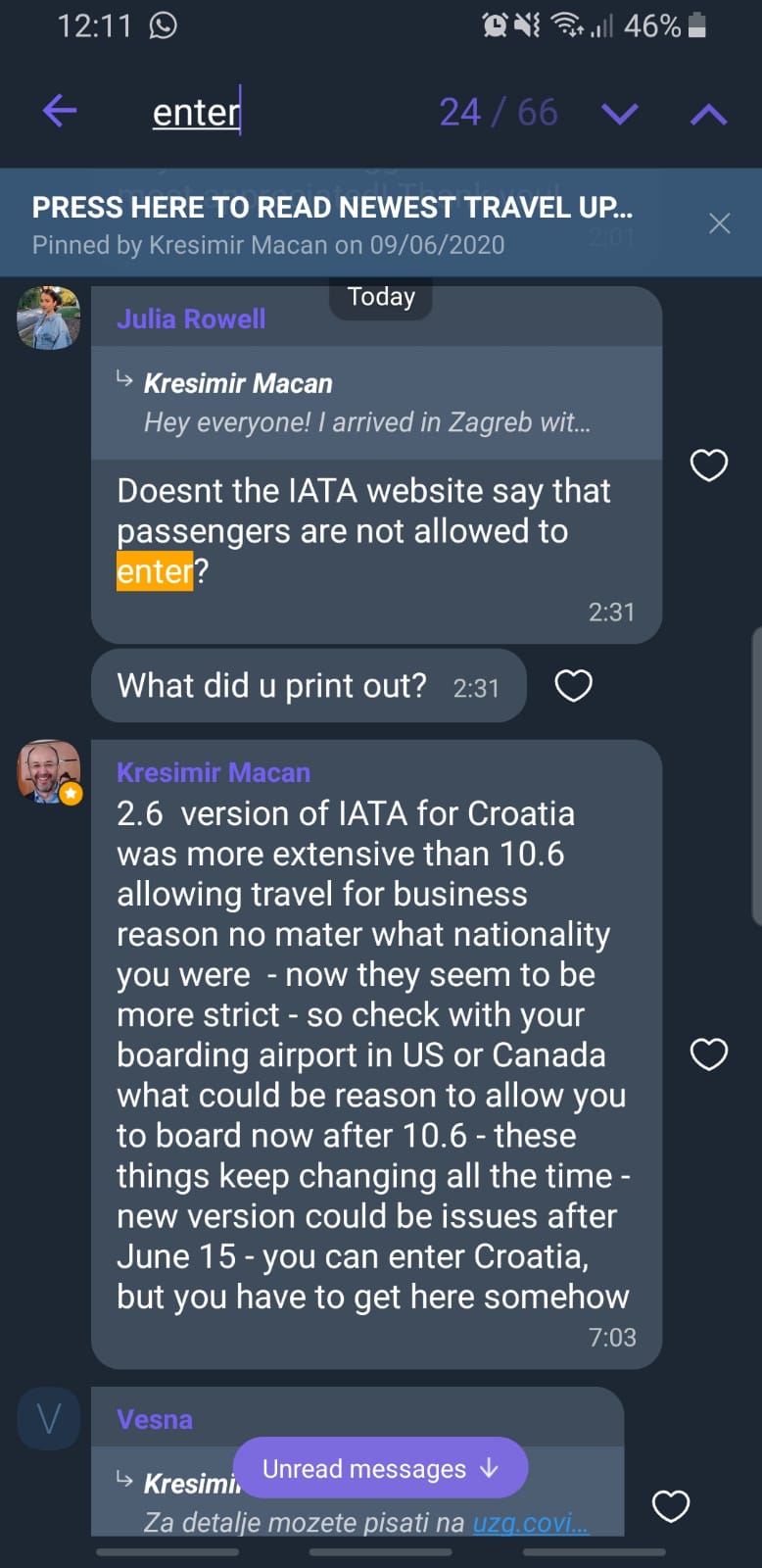
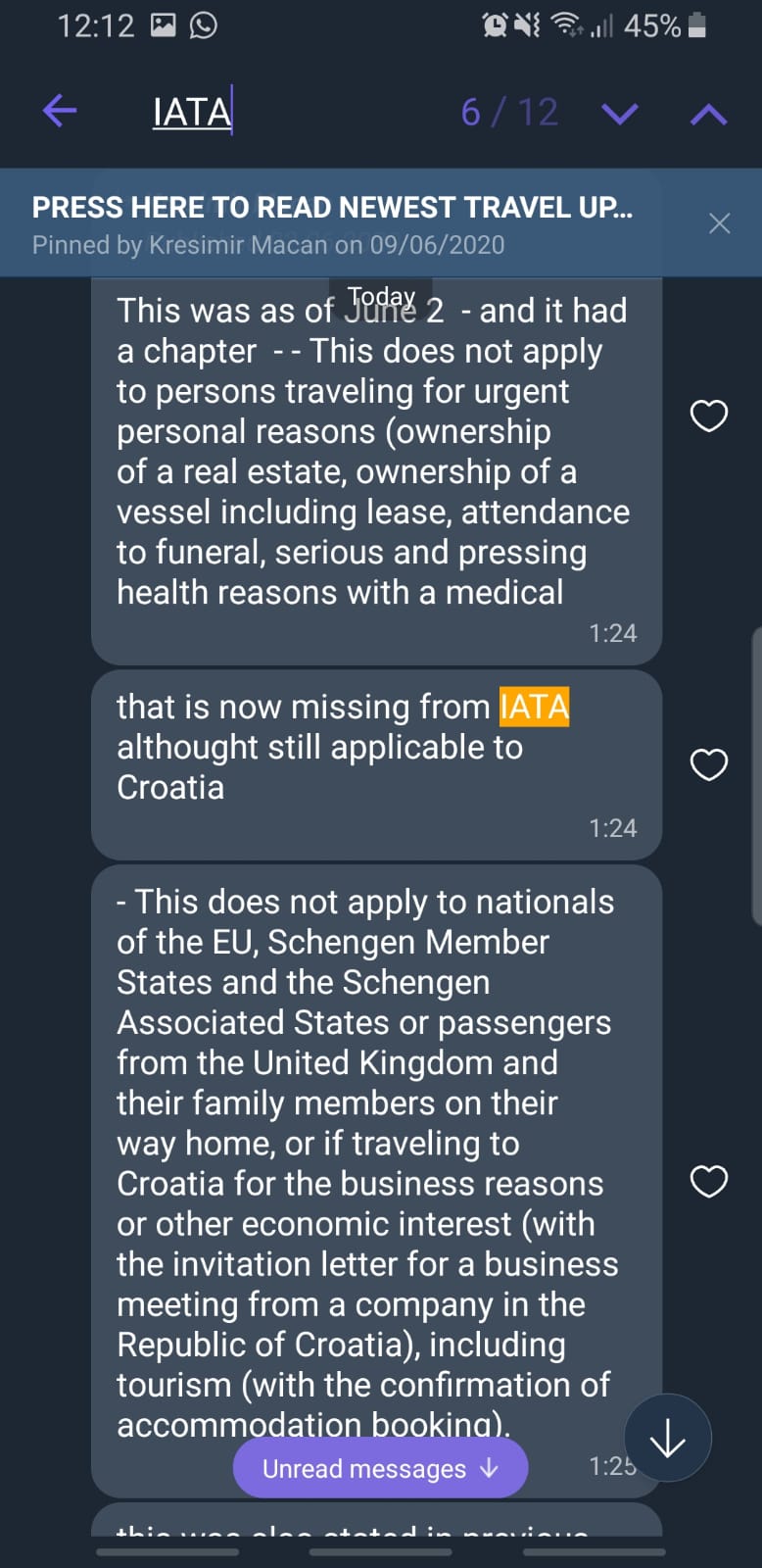
As mentioned above, many airlines are unaware of the guidelines, and some passengers have been refused entry. Some advice, if that happens:
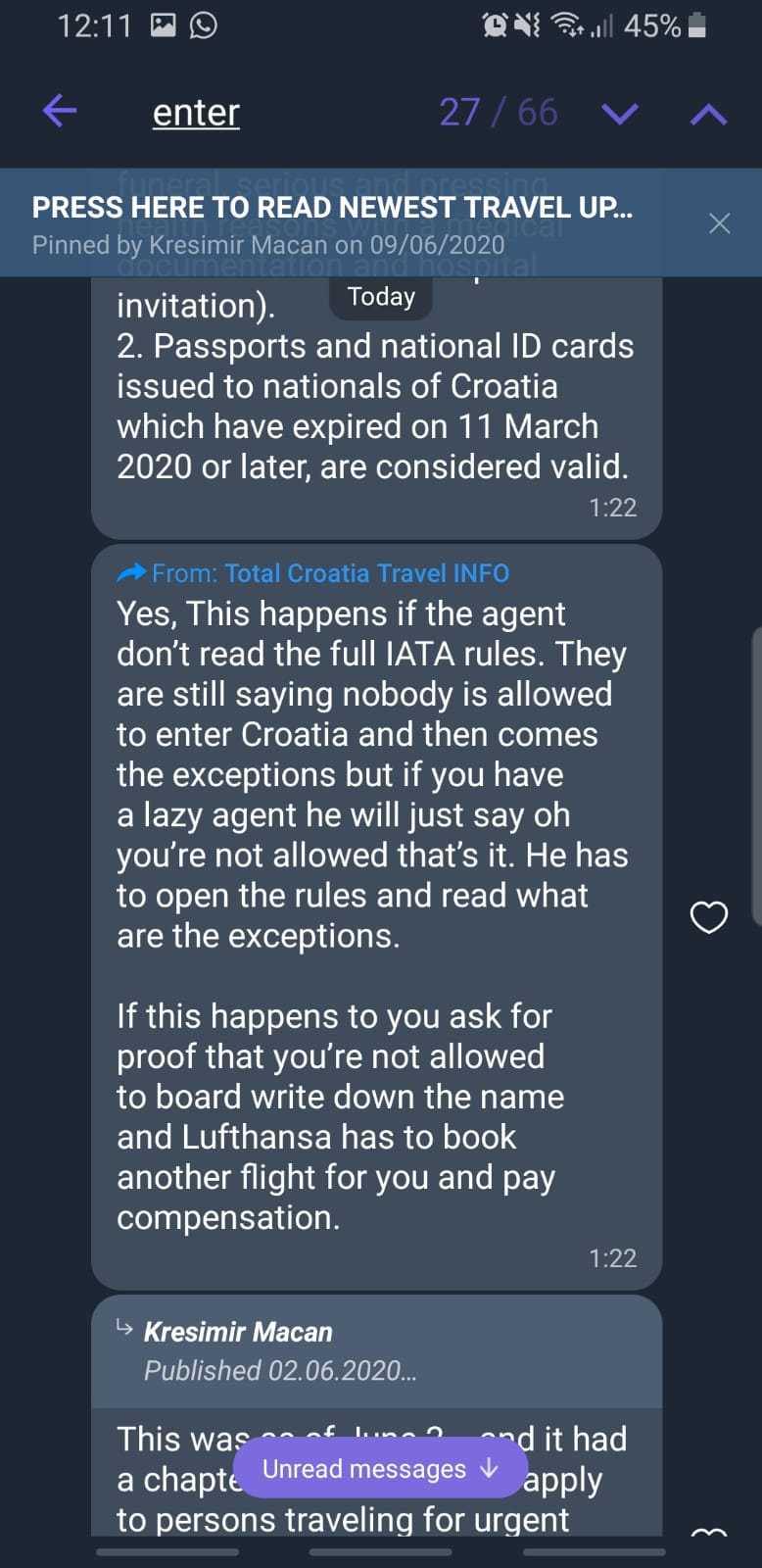
Below, a passenger experience that prevailed, with the following documents in tow:
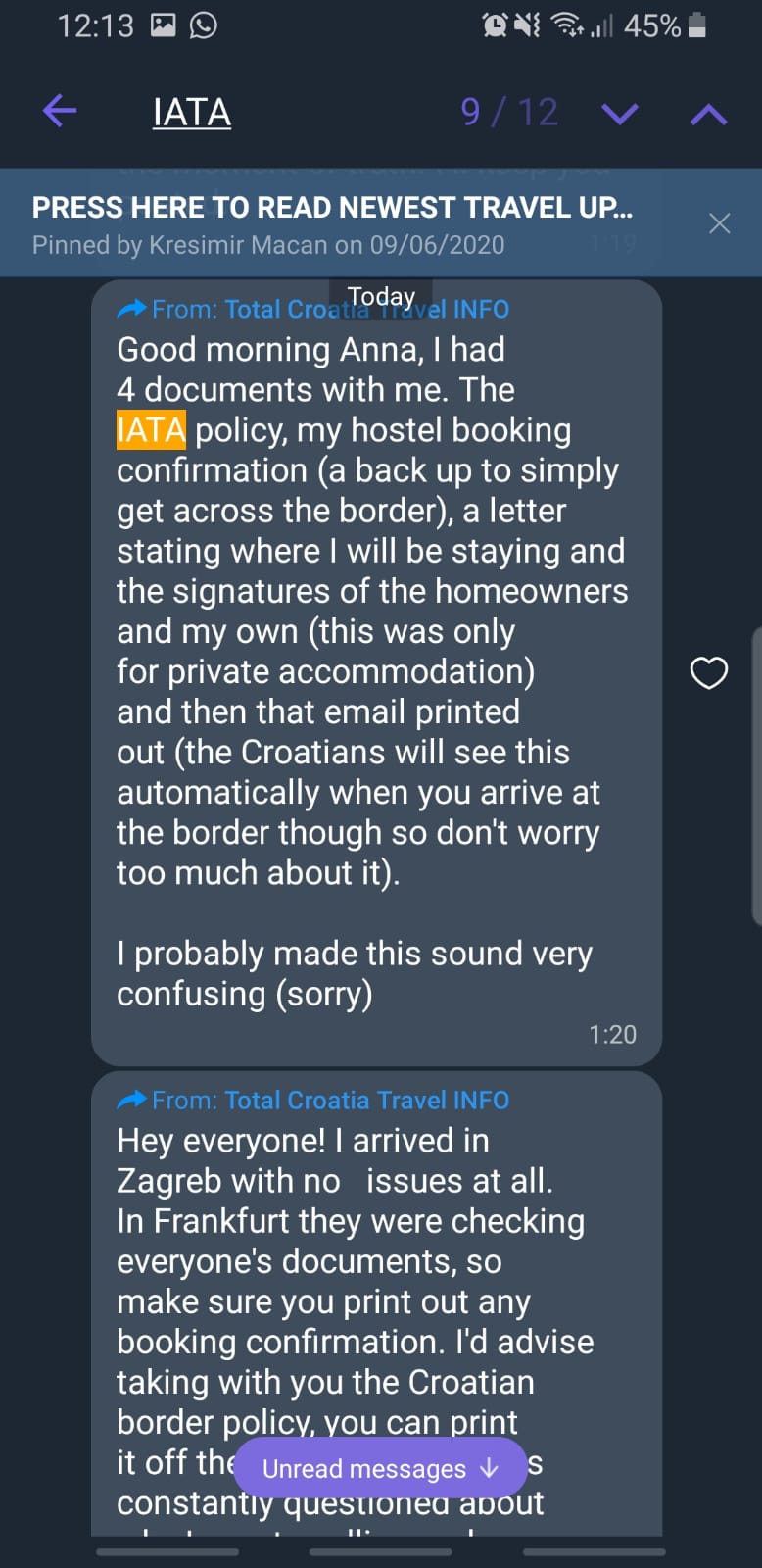
Remember, if you're traveling to Croatia, not only is it important to print out the IATA guidelines for Croatia, but make sure you have filled out the Enter Croatia form, have booking confirmation, and an email confirmation from MUP, for good measure (This email address is being protected from spambots. You need JavaScript enabled to view it.).
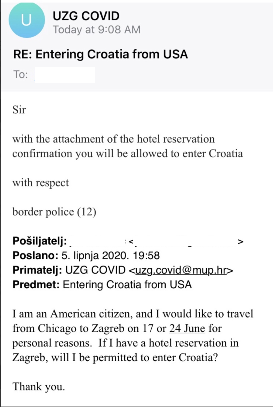
For the latest travel info, bookmark our main travel info article, which is updated daily.
Read the Croatian Travel Update in your language - now available in 24 languages
Croatia Among Countries with Cleanest Swimming Waters in Europe
June 9, 2020 - When planning your summer holiday after the corona crisis, cleanliness is certainly one of the factors topping the list. Good news for those of you choosing Croatia, which boasts some of the cleanest swimming waters in Europe.
Croatia is one of five European countries with the cleanest bathing waters, the European Environment Agency (EEA) announced on Monday, as borders begin to open after the corona crisis and tourists consider where to spend their summer holidays.
Namely, Dalmacija Danas reports that the cleanest swimming waters in Europe are in Cyprus, Austria, Malta, Greece and Croatia, according to a report by the European Commission and the EEA.
Those five countries received an excellent rating of at least 95 percent for their swimming areas. In Cyprus, 99.1 percent of bathing places received a rating of "excellent".
Tourists who fear being infected with the coronavirus while swimming should follow the guidelines of national or local authorities, the agency says. They should keep physical distances and wash their hands often enough.
Just under 85% of swimming sites across Europe monitored in 2019 met the European Union's highest and most stringent ‘excellent' quality standards. The agency tested bathing areas on about 22,300 sea, river and lake beaches in the EU, including Britain, Switzerland and Albania.
About two-thirds of the bathing areas are at sea and they are generally cleaner than the waters inland. Tests found that 294 sites, or 1.3 percent, have poor water quality and pose a risk for diseases such as diarrhea.
Commissioner in charge of the Environment, Fisheries and Oceans, Virginijus Sinkevičius, said, “Clean bathing water is usually taken as something that is gifted, but it's actually one of the European collective achievements. It's the result of hard work by many people over many years. This year's report once again confirms that European citizens can continue to enjoy very high-quality standards when bathing in European waters and all measures must be taken to continue along this path.”
To read more about lifestyle in Croatia, follow TCN's dedicated page.
Austrian Media on Tourism Challenges in Croatia: Worse than in War
June 3, 2020 - Austrian newspaper Die Presse and the German Rheinische Post (RP) published an article by journalist Thomas Roser entitled "Croatia: Worse Than in War", which talks about the challenges of this tourist season in Croatia. "The crisis has hit tourism-dependent Croatia hard," the article said, noting that it could be good for Croatia in the long run.
Index.hr reports that the beginning of the article describes the empty Opatija, which is usually full of tourists at this time of year. "Spring in Opatija is always beautiful, but this year it was strange without guests," says Radovan Lazic from the Adriatic Hotel, who adds that there were people in the hotel during the war, there were refugees, but that during the pandemic there were none.
Croatia's dependence on tourism
"Cancellation of reservations, financial pressure is growing, insecurity is growing - all this is upsetting people," Lazic describes the atmosphere in the hotel industry.
No European country is as dependent on tourists as Croatia, and they point out that the income from tourism is almost a fifth of the country's GDP. "The crisis caused by the coronavirus has, therefore, hit the newest EU member like no other: according to the Vienna Institute, Croatia will have an economic decline of 11 percent," Die Presse and RP reported.
The Croatian Adriatic will be officially open to tourists from June 15, and the congress gatherings scheduled for the spring will be postponed to the autumn.
Varteks expects a better market position
The article also cites a different example from the Croatian economy, namely Varteks, who, after a long crisis last year, was given new capital and new life, and now, in addition to tweed suits, protective masks are also sewn.
The president of the board, Tomislav Babić, is not pessimistic about the future, the article states. Babic believes that production will return from Asia to Europe. "We produce for a market that is close to us, so we can react quickly to trends, unlike the competition that imports all its goods," says Babic.
Balkans: Low wages and labor
The article points out that the Balkans could perhaps benefit from supply chain disruptions during a pandemic because now European countries will want to have production nearby instead of in Asia, and there is a workforce in the Balkans. Salaries are also not high.
"It took Croatia half a decade to recover from economic growth after the 2008 crisis. This time it could go faster: 4 percent growth is projected for 2021," the article said, adding that it would take several years to make up for this year's minus. The state's indebtedness will rise to 90 percent, so there is a possibility that "the youngest member will not be able to get closer to the EU average again, but will end up on the floor."
Increasing the number of unemployed
The cancellation of the European Capital of Culture in Rijeka is also mentioned as another blow to Croatia.
Unemployment is a particular problem, rising 32.4 percent from March to May. The current number of 160,000 unemployed could double by the end of the year, according to journalist Thomas Roser. Finally, he quotes Index and warns that "an avalanche of cancellations is yet to come."
To read more about lifestyle in Croatia, follow TCN's dedicated page.
Capacity for Indoor and Outdoor Gatherings in Croatia Defined
May 29, 2020 - After the National Civil Protection Headquarters lifted the ban on gatherings of up to 40 people in Croatia, on Thursday, the Croatian Institute of Public Health (CNIPH) specified the maximum numbers.
Therefore, Jutarnji List reports that, based on the recommendations of the Croatian Institute of Public Health, 300 people are allowed indoors, while outdoors, that number has risen to 500.
Of course, as explained earlier this week, this is due to the favorable epidemiological situation and the small number of active cases, and the minimal or no number of new cases.
Regarding the recommendations, the CNIPH provided brief guidance. Thus, a distance of one and a half meters is recommended, except for people who live in the same household or otherwise socialize. Also, four square meters of space should be counted per person.
Among other recommendations, the CNIPH states that the mouth, nose and eyes should not be touched with the hands, hand disinfection is not mentioned, but indoors, mouth and nose masks should be worn by people who think they could develop more severe forms of the disease if they become infected with COVID-19.
It is not specified which categories of people these are, but considering the previous warnings, this should refer to the elderly, and people with a weaker immune system, i.e., the chronically ill.
Another big announcement on Thursday was that the borders have been fully reopened by Croatia to citizens of no less than ten countries.
Citizens of Czechia, Slovakia, Hungary, Austria, Estonia, Latvia, Lithuania, Poland, Slovenia, and Germany can enter Croatia without restriction.
“According to our comparative analysis of the epidemiological situation, those are the countries with either similar progress as Croatia or the trends are such that we can adopt such a decision and enable the arrival of those countries’ citizens during the tourist season, with the appropriate epidemiological recommendations and the special application that has already been made,” Croatian Prime Minister Andrej Plenkovic told his cabinet.
To read more about news in Croatia, follow TCN's dedicated page.
Croatian and Slovenian Ministers Talk Cooperation After Corona Crisis
ZAGREB, May 28, 2020 - Croatian and Slovenian economy ministers, Darko Horvat and Zdravko Pocivalsek, met on Wednesday in Mursko Sredisce for the talks on economic cooperation after the crisis caused by the coronavirus pandemic and on better connectivity with the construction of a new bridge across the Mura River.
After the meeting on the bridge across the Mura River and in the office of the mayor of the Croatian border town of Mursko Sredisce, Minister Horvat said that both economies were cooperating very well and they were the top five strongest trade partners to each other.
They pledged to make sure that the bilateral cooperation should be raised as soon as possible to the level it was prior to the corona crisis.
"We agree that the corona threat has warned us and compelled us to develop much better cooperation in the segment of the common European market but also as two countries that have very good economic relations," said Horvat.
With reference to Croatia's current presidency of the European Union and future chairmanship by Slovenia In the second half of 2021, he added that the two countries have been cautious when it comes to the aim of having climate-neutral industries by 2050 and where to find favourable funding to reach that target.
Minister Pocivalsek recalled that last year was a record year for trade between Croatia and Slovenia, exceeding €6 billion.
"We have to take pride that we overcame the corona crisis as far as the health aspect is concerned better than countries that are more advanced and economically developed than us. That gives me hope that we will turn this year's negative trends into positive figures. And they will be better if we cooperate better," Pocivalsek said.
He added that the first step to open the borders has been taken by allowing the owners of properties and vessels to enter the country and that as of June 1, the border should be opened for tourists.
The two ministers discussed the construction of a new bridge across the Mura River and a bypass around Mursko Sredisce which would relieve this northern Croatian town of freight traffic in the centre of town. Horvat said that determining junction points was important for the preparation of project documents for the new bridge and bypass road.
Mayor Drazen Sprak said that the road was not only important for the town but that it would also connect the Slovenian motorway from Graz through Maribor towards Budapest and Croatia's motorway from the Hungarian border at Gorican towards Zagreb and then on to Rijeka and Split.
Ministry Gives Info on Requirements for Entry in Croatia
ZAGREB, May 22, 2020 - Tourists from EU member-states who have booked accommodation in Croatia are supposed to show documents confirming the booking, when they enter the country, the Croatian Ministry of Interior Affairs says on its web site.
This site contains frequently asked questions and answers regarding the conditions of entry into Croatia considering the restrictions in place to prevent the spread of COVID-19 and answers are available currently in Croatian, German and English in the site's section UZG COVID.
Foreigners possessing property or a vessel in Croatia are supposed to show the document, for instance, a title deed or a purchase contract, confirming their ownership, when they are arriving in Croatia.
Considering the questions about self-isolation, the ministry says that "the measure of self-isolation is no longer imposed on all passengers on border crossing points when entering the Republic of Croatia."
Leaflet with HZJZ instructions to be given to persons entering Croatia
"It may be imposed only on individuals for whom it is determined during border checks that they have been in contact with a person infected with COVID-19."
"However, when entering the Republic of Croatia, border police officers will provide you with a leaflet containing instructions and recommendations issued by the Croatian Institute of Public Health (HZJZ) which you have to comply within the following 14 days," the ministry said.
Thus, the ministry presents the 11 most frequently asked questions and answers to them, considering the conditions and the status of travellers entering Croatia as of 22 May.
As for the COVID-19 infection, Croatia has single-digit daily statistics for weeks.
Croatia, Slovenia to Initial Agreement Simplifying Border-Crossing Procedure
ZAGREB, May 21, 2020 - By the end of this week Croatia and Slovenia are expected to initial an agreement that would simplify cross-border travel for the two countries' nationals, after their border was recently reopened, but with significant waiting times for those wishing to cross it.
Slovenian government spokesman Jelko Kacin said on Thursday that the two countries' police commanders had agreed that by the end of the week they would initiate an agreement that would facilitate cross-border travel for Croatian and Slovenian nationals, that would cut waiting time.
Considering their similar epidemiological situations, the two countries have already opened their border for cross-border travel.
There have been no new cases of COVID-19 in Slovenia in the last 24 hours and one person has died. So far, 1,468 people have been infected and 105 have died, the government said.
The number of hospitalised patients has been on the decline, and currently 21 people are being treated in hospital, including three in intensive care units.
According to the Slovenian Health Ministry, there are only 20 active infections, which enables the further easing of COVID-19 restrictions.
Kacin said that Croatian border police would soon have an application to enable Slovenians who frequently travel to Croatia, after they register with the application for the first time and state their personal information, to be allowed across the border faster than now.
Slovenia plans to sign agreements on cross-border travel with other neighbouring countries as well, Kacin said, adding that the first country on that wish list was Austria.
Croatia Supports Merkel-Macron Rescue Plan, Says Daily
ZAGREB, May 21, 2020 - The Croatian government support the establishment of a €500 billion European fund to help repair the economic damage from the coronavirus pandemic, Jutarnji List daily reports on Thursday, noting that the money to be obtained from the fund could be used for recovery in the tourism and transport sectors.
The government supports the Franco-German rescue plan, which, according to the proposal put forward by German Chancellor Angela Merkel and French President Emmanuel Macron, envisages the establishment of a €500 billion rescue fund which would be set up as part of the EU budget for the period 2021-2027 and be financed with loans to be sought by the European Commission, the daily says.
The money form the fund would be directed to regions and sectors worst hit by the coronavirus pandemic.
"We welcome the initiative, notably in the segment that refers to the sustainable recovery of the worst-hit EU sectors and regions. There are sectors in Croatia that have been affected, we have been affected as a country, and we also expect funding from the new Multiannual Financial Framework (MFF) for cohesion policy," Zvonimir Savic, Prime Minister Andrej Plenkovic's special advisor on economic affairs, told the daily.
Savic added that the amount that was being proposed was significant and that Croatia considered as important the fact that it would be part of the new MFF.
The initiative itself is a clear message of European solidarity and it is important that the proposal is being put in the context of the MFF because time must not be wasted, he said.
The new EU budget goes into force in 2021 and now is the ideal time for talks on the rescue plan, which, among other things, envisages strengthening the EU’s competences in the health sector, supporting the single internal market and, most importantly, supporting sectors and regions affected the most by the pandemic, Savic said.
Slovenia Lifts All Restrictions for Croatians Entering its Territory
ZAGREB, May 19, 2020 - The Slovenian government has decided that Croatians are free to cross the border into Slovenia without having to undergo mandatory quarantine as the two neighbours have similar epidemiological situations.
The STA news agency reported on Tuesday that "Croatia became the first country Slovenia put on a list of countries whose nationals may enter without limitations."
Last week Slovenia declared the end of the COVID-19 epidemic and announced the reopening of borders for the European Union and the European Economic Area citizens.
Slovenian Economy Minister Zdravko Pocivalsek and Hungarian Foreign Minister Peter Szijjarto on Monday discussed the plans for reopening the borders between EU member-states with similar epidemiological situations.
Slovenia and Austria have launched the talks on this topic, too.
Over 14,000 Foreigners Entered Croatia Since May 9
ZAGREB, May 16, 2020 - Over 14,000 foreigners have entered Croatia and over 36,000 Croatian citizens have left the country since May 9, when a decision on crossing the border during the coronavirus epidemic was changed, Police Director Nikola Milina said on Saturday.
Speaking on N1 television, he said over 50% of the foreigners who entered Croatia were Slovenian citizens and that the Croatian citizens who left the country did so across the Slovenian border.
Under a decision of the COVID-19 crisis management team, as of May 9 foreigners are allowed to enter Croatia in case of economic interests or urgent personal reasons, and Croatian citizens are allowed in and out of the country.
Milina said the ministries of tourism, public administration and interior were intensively working on an app that would step up crossing the border for foreigners.
If foreign tourists give their information via the app, the information would be available to the border police and border control would take one step, he added.
Milina said illegal migrations over the past two months were down 50% on the year.
He denied accusations that Croatian border police were treating migrants unlawfully, saying they were doing their job in line with the law and professionally.


